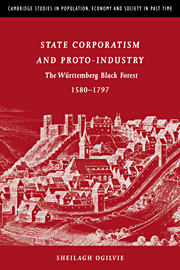Book contents
- Frontmatter
- Contents
- List of figures
- List of tables
- Acknowledgements
- List of abbreviations
- Weights, measures and coinage
- Glossary
- Maps
- 1 Introduction
- 2 The proto-industrialization debate
- 3 Social institutions in early modern Württemberg
- 4 The Black Forest worsted indust
- 5 The finances of the proto-industrial guil
- 6 Labour supply and entry restrictions
- 7 Production volume and output controls
- 8 Population growth and the family
- 9 Corporate groups and economic development
- 10 Corporatism and conflict
- 11 Proto-industry and social institutions in Europe
- 12 Conclusion
- Bibliography
- Index
- Cambridge Studies in Population, Economy and Society in Past Time
2 - The proto-industrialization debate
Published online by Cambridge University Press: 29 October 2009
- Frontmatter
- Contents
- List of figures
- List of tables
- Acknowledgements
- List of abbreviations
- Weights, measures and coinage
- Glossary
- Maps
- 1 Introduction
- 2 The proto-industrialization debate
- 3 Social institutions in early modern Württemberg
- 4 The Black Forest worsted indust
- 5 The finances of the proto-industrial guil
- 6 Labour supply and entry restrictions
- 7 Production volume and output controls
- 8 Population growth and the family
- 9 Corporate groups and economic development
- 10 Corporatism and conflict
- 11 Proto-industry and social institutions in Europe
- 12 Conclusion
- Bibliography
- Index
- Cambridge Studies in Population, Economy and Society in Past Time
Summary
Long before the first factories, Europe had ceased to be a homogeneous ‘less developed economy’, producing largely for subsistence and trading only in luxuries. From about 1500 on – earlier in some areas, much later in others – it developed into a differentiated patchwork of interdependent regions, specializing in a wide array of agricultural and industrial activities, and trading in mass commodities through a network of towns and cities. This is something of which specialists have long been aware. But in the 1970s a series of publications appeared which focussed on the industrial aspect of regional specialization, christened it ‘proto-industrialization’, and argued that it was an important cause of factory industrialization and the whole transition to capitalism. These ‘theories of proto-industrialization’, as they came to be called, agreed about two things: first, proto-industry was central to the economic development of modern Europe; and second, it transformed demographic as well as economic behaviour. But they disagreed about practically everything else, including the causes of European economic development in the centuries before industrialization.
The original version of the theory was put forward, along with the term ‘proto-industrialization’, by Franklin Mendels. Mendels argued that the expansion of rural industry broke down traditional demographic behaviour: in traditional agrarian economies, the marriage rate followed movements in the economy, but in the Flemish proto-industrial region Mendels studied, marriages increased in a ‘good’ year (measured by a high ratio of linen to rye prices), but did not decrease in a ‘bad’ year.
- Type
- Chapter
- Information
- State Corporatism and Proto-IndustryThe Württemberg Black Forest, 1580–1797, pp. 16 - 34Publisher: Cambridge University PressPrint publication year: 1997
- 1
- Cited by

